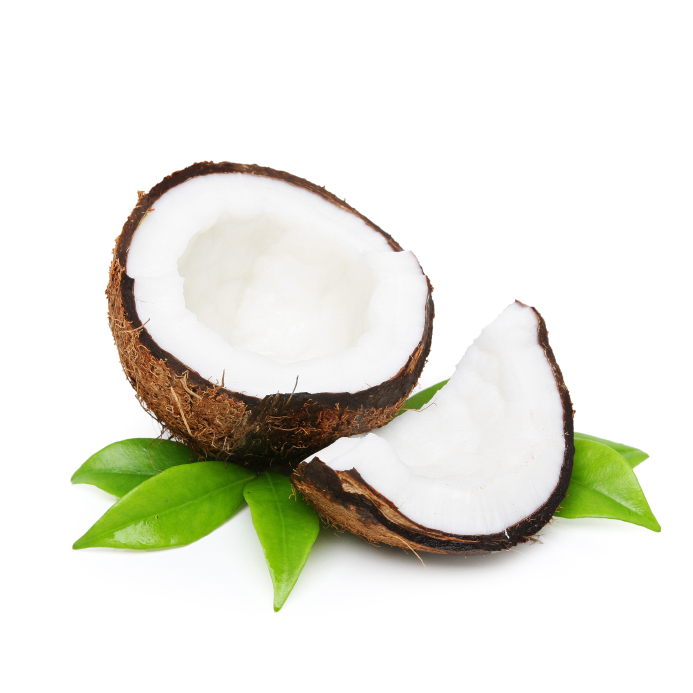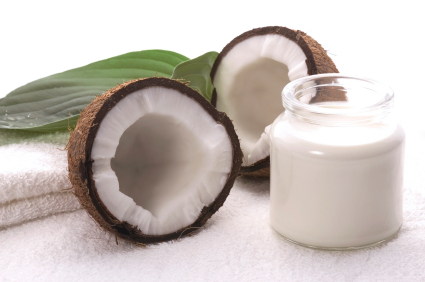Coconut milk is basically the liquid that is extracted from the flesh of the coconut and is not from the liquid within the coconut itself. Coconut milk is becoming more popular as a natural and vegan light protein and moisture treatment for the hair.
What sort of coconut milk/cream do I buy?
Check out the ingredients: Some coconut milks aren’t really coconut milks, but are just thickened coconut flavoured water. Of course, you can make your own coconut milk and cream with dessicated/shredded coconut* (recipe below), but if you’re not into doing that, check out the selection at your supermarket, particularly in the organic section.
How do I use coconut milk/cream on my hair?
It is best to cleanse the hair of build-up prior to using a coconut milk treatment in order to get the most benefits from the treatments. To clarify, you can use a commercial clarifying shampoo. If you’re totally natural, dissolve 1 TBS of baking soda in 2-3 cups of warm water, or a clarifying shampoo bar such as Henna Sooq’s Soapnut Shampoo Bar. There are a few ways to enjoy coconut milk treatments:
Straight/on its own-
Apply to clarified, towel dried hair. Best for those with coarser hair. Honey/molasses can be added for extra conditioning.
With conditioner-
Add a tablespoon or so to enough natural conditioner to cover your hair. This is best for those with finer hair or for those starting out with coconut milk as a treatment.
With cassia herbal treatments such as cassia, henna, or any other herb pack – Add a couple of tablespoons of coconut milk. This is great for fine-coarse hair or anyone wanting to try out coconut milk as a treatment.
My hair is SO oily/sticks together after a coconut treatment
If the hair feels oily after washing, just re-wash the hair. Herbs such as aritha and shikakai can also be used to wash out the coconut milk.
My hair is really crunchy after coconut treatment
This could be a couple of things; one is an overload of protein. To remedy this, soak your hair in conditioning/moisturising hair cream in for a couple of hours, or apply oil to damp hair, cover with plastic and leave for several hours to over night, then wash out with your choice of wash.
The second cause of crunchy hair after coconut milk treatment could be build up itself. Rewash If your hair feels weighed down and unmanageable prior to this treatment, clarify before the coconut milk treatment.
Coconut milk is too heavy, but I still want it to work with my hair..is there a happy medium?
Yes… of course! Add a tablespoon or two (more for longer hair) of coconut milk/cream to a natural conditioner, cassia, henna or other herbs and apply to freshly washed damp hair. Remember, a little goes a long way. Treat coconut milk like a heavy cream/light oil.
Can I do a coconut milk/cream treatment over night?
If you’re wanting to do a coconut milk treatment, try the over night method:
Apply coconut milk generously to freshly washed damp hair and cover a couple of hours before bed time. About an hour before bed time, rinse your hair with cool water, gently blot your hair with a towel and apply shower cap/plastic bag. Sleep on it. In the morning, rinse with warm water, wash and condition as usual. This method is especially excellent for coarse hair.
*Coconut milk recipe.
What you need:
- 2 cups Desiccated coconut (unsweetened)
- 2 ½ cups of hot (almost boiling) water.
- Cheese cloth/fine cloth, damp.
- 2 large bowls
- wooden spoon
Pour the hot water over the coconut and stir well for at least 2 minutes. Cover and let sit for around 30 minutes, or until the mixture is cool enough to handle (warm-lukewarm). Line the other bowl with the cloth, pour the coconut mixture into the cloth, gather the corners and squeeze the coconut until you can’t get any more milk out. Scrape the coconut off the cloth back into the first bowl, add another 2 ½ cups of hot water and repeat the process. Combine the two, pour into a jar or tupper-ware and keep refrigerated.
Great additives for a coconut milk treatment:
Honey, molasses (for darker hair), essential oils, glycerin (for the humid and rainy day treatments), powdered herbs.
Experiment to find your optimal treatment. As with everything, what works for others may not necessarily work for you and vice versa.



















My hair are fine , thin and fall a lot. Could U recommend something pls ? I am not young but I would really appreciate if U would suggest something besides being a salesperson.
Thank you for your post Shehnaz. The good thing about Henna Sooq is that we aren’t salespeople. I’m one of the owners and I specialize in henna and ayurvedic hair care for over ten years. We began this business as our own passion, and methods of hair care and body art.
I’d recommend our Ayurvedic Strength Hair kit as regardless that we sell this or not, you’ll need ayurvedic herbs which are medicine for the hair in order to strengthen your hair. You came here to find a source that would offer you a natural solution. You don’t have to purchase with us, if you choose not to, but starting with organic amla powder, and organic cassia obovata are the two herbs that will help. We also recommend you use a very good hair oil such as Organic Camellia, or Organic Amla oil as well. Thank you
hi! need help plz can u plz suggest me any home recipe for my frizzy,dry and dull hair ,my hair wavy mediuam i try many shampoo conditinor and egg recipe but still the same nothing make my hair silky and smooth…………………plz suggest me what to do? thank you
Hi Suzzain, you could use our shampoo bars. Please view them and our products at http://www.hennasooq.com/moisturize
hello, i was just wondering if i could keep the Organix Nourishing Coconut Milk Conditioner in my hair for an hour or two? would it work better? Should I do it with dry or wet hair?
Morning Didi. Sorry we don’t know as that isn’t a product we carry but you can ask Organix directly yourself. We’re a natural hair company so we specialize more in do it yourself with 100% pure herbs and natural products without additives etc….
This is an excellent & extremely informative article, I’m very appreciative of it’s posting & pertinent information. I prefer utilizing Coconut Milk in my Henna/Ayurvedic hair packs as opposed to lemon because the lauric acid will release the dye lawsones just as efficiently as well as give the much needed moisture to kinkier hair types require. When treating my hair to a Henna/Ayurvedic hair pack, I alternate between Coconut Milk or Full Fat Greek Yogurt (high in lactic acid, which is extremely moisturizing as well as excellent in releasing lawsones). I’m partial to adding Molasses in my Henna/Ayurvedic hair packs due to being moisturizing, strengthening, nutritionally mineral rich,better,choice for darker results as well asa vegan product!
My hair is very frizzy and naturally curly, though barely holding a curl from past damage that is still growing out. I plan to start a strictly coconut regimen. Its going to consist of a coconut milk shampoo that will alternate with argon oil, macadamia oil, and almond oil from wash to wash. I plan to pair with a coconut milk with raw organic honey conditioning rinse, which will only be in hair for about two minutes. I wash my hair no more than twice a week. And I will also do a every two week mask of coconut oil and egg. I’m afraid that with this regimen I could go way overloaded with protein. Since I don’t wash regularly, I really don’t know how this will go. Any advice?
I’m not sure how your hair will take to the protein either as really sometimes, it’s trial and error. I might still just slowly add in the coconut treatments. or protein in general. Usually protein treatments can be done every 3-4 weeks, let’s say if we were recommending our Sukesh Ayurveda that works like a protein treatment that would be a good option to spread it out a bit more.
I’m 46 years old. My hair began shedding over the past year, but recently it has become thinner in circumference as well. I’ve also been experiencing tingly/itchy sensations, even burning at times. Does any of this sound familiar? I haven’t been feeling overall very well either, but all blood work has been normal. Are my doctors missing something? Is my hair loss/thinning related?
Thank you for your post Heidi. I personally have not been told of a similar, severe case such as yours. Sorry. I’m not a doctor so I tend not to be asked about severe cases typically. Have you tried visiting a homeopath? Someone who practices natural medicine? Have you tried any hair treatments from us such as Sukesh Ayurveda for scalp and hair healing?
Hgerm, you should visit a dermatologist for an evaluation and possible scalp biopsy. My hair has done the same thing periodically for years (20 years), accompanied by hair loss/thinning. I have maintained the natural hair that I do have with monthly cortisone shots, strengthen with henna, I use only natural products on my hair, improved my diet, drink water, etc. My case is extreme, however, its not visible to many people because I work to take care of the hair I have (its almost armpit length albeit thin). All the best to you.